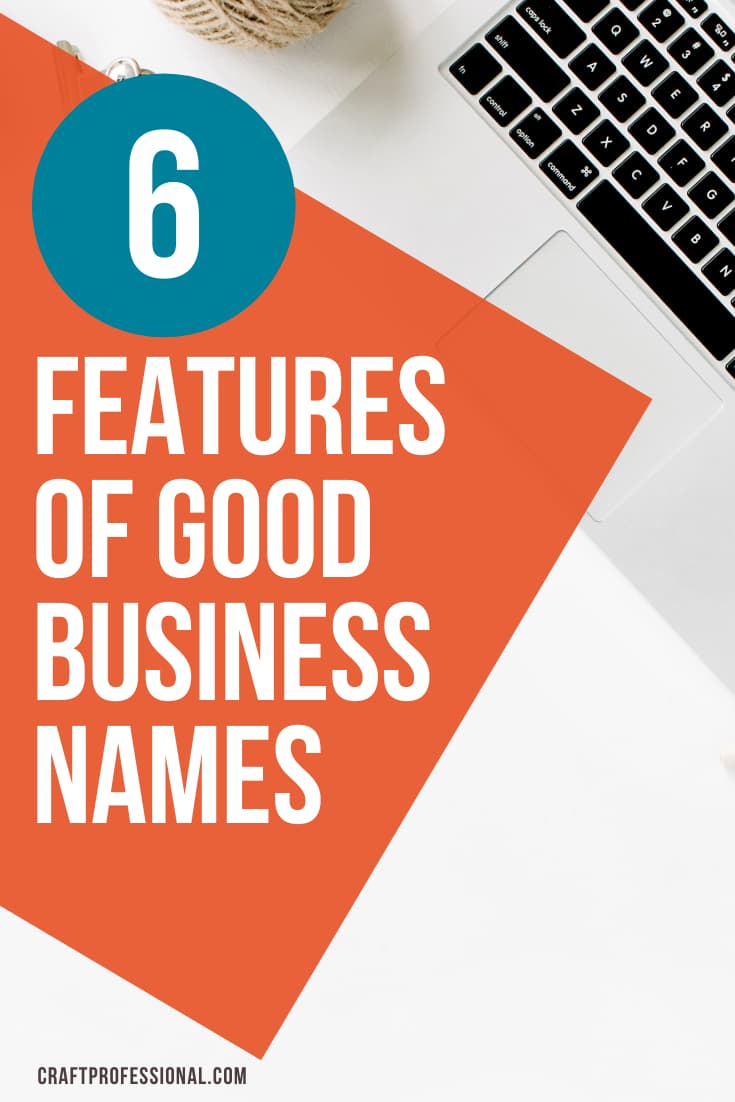6 Traits of Good Business Names
Separating good business names from bad company names can be tough for any small business owner.
Coming up with a great business name is a task we all confront as entrepreneurs. Getting it right is important. But you're an expert in your business niche. You're probably not an expert in business naming.
If you're starting your business on a tight budget, you probably don't have the funds to pay an agency to help you with the task of coming up with a clever company name. You'll need to DIY this job. To do it right, your first task is to learn how to recognize good business names, so you can avoid an unfortunate naming fail.
How to Choose a Good Business Name
Look for these 6 characteristics of good business names:
- Communicates something meaningful about the company
- Touches people's emotions in some way
- Engages the senses
- Easy for customers to recall
- Simple, easy to read, pronounce, and understand
- Full of thematic potential to use beyond the name
If your name doesn't reflect all 6 qualities, don't panic! It's not necessarily a fail. But the more of these qualities you can encapsulate in your brand, the more powerful it will be.
Favorite Business Naming Resources
Hello, My Name is Awesome by Alexandra Watkins
Brand New Name by Jeremy MillerLet's look at each characteristic of good business names in some detail.
1. Communicates something meaningful about the company
Good business names carry meaning. Of course, you can't say everything about your company in a word or two, but your name should communicate to your customers some essential quality.
If great company names reflect some important quality of your business, then before you do anything, you need to decide what qualities you'd most want to communicate to customers.
Related: How to write a naming brief to determine what you want from your company name.
You'll need to take some time to define key elements of your company and develop a clear understanding of what makes it special.
Ask yourself: What do I want people to immediately know about my company?
No matter what makes your company special, your business' name can be a powerful tool designed to communicate that quality to customers.
I earn a commission for purchases made through links on this page.
To learn more, please see my disclosure.
Be wary of names that are too literal
Be careful about using terms that are too "on the nose" (that is, too literal) when you name your business. You might end up with a name that feels unimaginative or lacks nuance.
Instead of directly naming the quality you want to evoke, try brainstorming business name ideas using words that symbolize the quality you want to bring to mind.
Symbolism or metaphors can be an elegant way for a brand to convey meaning. Plus, creative company names that use symbolism can be rich in potential for visual imagery and will often lend themselves to extending the concept into branding beyond the name.
2. Touches people's emotions in some way
A business or product name that elicits an emotional response engages people.
Business naming expert and author of the book Hello, My Name is Awesome, Alexandra Watkins says names that effectively target the right emotion influence buying decisions and can even entice people to pay more for your product.
Remember, "moving" and "emotional" don't have to mean sappy. If you make fiery hot barbecue sauces, your business and product names could evoke passion. If you make the ultimate in luxurious bath products, your business and product names could evoke pure bliss.
Think about how you want customers to feel when they engage with your business, and look for ways to communicate that emotion as you brainstorm business name ideas.
3. Engages the senses
Good business names are not too abstract. They engage the senses. A name that uses concrete words to conjure up images can be particularly memorable and effective.
Abstract words vs. concrete words
What on earth is the difference between an abstract word and a concrete word?
To clarify, let's compare two words that could be used to describe the same idea:
- Unique - An abstract word that doesn't evoke strong imagery.
- Unicorn - A concrete word that does evoke strong imagery.
Beyond describing a mythical creature, the word "unicorn" has taken on a whole new layer of meaning. It has come to be a fairly well known metaphor for anything wonderfully unique. This little trend has caught on, in part, because the word calls up such strong imagery.
The word "unique" is pretty abstract. No specific image comes to mind when you think of the word. But the word "unicorn" is concrete. It conjures vivid images of the mythical creature.
You'll remember something described as being a unicorn longer than you'll remember something described as being unique even though, in this case, both words communicate the same basic idea.
Related: How to Name a Business Step-by-Step
To be clear, I'm not saying everyone should run out and name their craft business after the mythical creature. It's just a quick example to help you see the difference between abstract words and concrete words.
To create a business that engages the senses, think about the words you want to use to describe your business, and consider whether those words are concrete or abstract. If they are too abstract, try to find alternative words that are more visual and concrete but convey a similar meaning.
4. Easy for customers to recall
Of course, you want shoppers to remember your company name so they can find you again in the future.
If someone stumbles upon your Etsy shop and loves your products, but they're not quite ready to buy, a catchy business name will help them remember enough to find you again when they come back later ready to buy.
Or if someone bought your heavenly handmade soaps at a craft show, and they realize they've run out and want to buy more, but they didn't keep your company information, a memorable name will help them find you online or at another local show.
How do you create a catchy company name that shoppers will remember?
As we've already seen:
- a name that's meaningful will be more memorable
- a name that engages the senses and evokes images will be more memorable as well
If you really want to ensure customers won't forget you, check out even more ways to create a catchy company name.
5. Simple, easy to read, pronounce, and understand
Good business names are simple. People prefer company names that are easy to read, spell and pronounce, and don't require a lot of thought or explanation.
Before I changed the domain name, this website had a long, convoluted, hyphenated, hard to spell, and hard to pronounce name. It was seriously awful. I can't even bring myself to type it here, it was so embarrassing.
An entrepreneur should be proud and happy to talk about their company, but I absolutely hated when people in my life asked me about my business. Inevitably, they'd ask the URL of my site, and it was painful to try to spell and explain it.
Not cool!
Granted, I originally named this site years ago. The internet was a very different place in 2006. But I still wish someone had told me to keep it simple back then. It would have saved me a lot of trouble rebranding.
Trust me. I speak from experience here. A complicated name that you have to constantly explain is no fun for anyone.
6. Full of thematic potential to use beyond the name
A clever business name that is rich in meaning can suggest a common theme that can be expanded throughout your brand.
If your name is full of meaning, you could expand the theme and use it in product names, packaging, merchandising and craft booth displays, and marketing materials.
You and your customers could have a whole lot of fun with a rich theme that runs from your company name through to all other elements of your business. All while solidifying the brand in your customers' minds.



New! Comments
Have your say about what you just read! Leave me a comment in the box below.